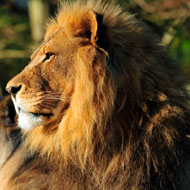Take a nap and raise money

The opportunity to raise funds for charity by having a leisurely, relaxing time doesn't come along that often but you can support the Born Free Foundation this week by taking part in their annual "Big Cat Nap".
Forget marathons, bike rides, sponsored walks and hikes, the international wildlife charity event encourages you to behave like a big cat - particularly a male lion that sleeps for up to 23 hours a day - and raise money by taking it easy.
Big Cat Nap week runs from Monday, June 30 to Sunday, July 6 and aims to highlight the plight of some of the world's most beautiful and endangered animals through a range of sleep-themed activities. You could choose to get sponsored for wearing pyjamas to work or school, raise cash by staying in bed or inviting friends over for a slumber party or if that's all too energetic you can take a sleepy pet selfie (human involvement optional) and share it via Facebook, Twitter or Instagram using #BigCatNap.
With big cat numbers plummeting - only 25,000 lions remain in the wild in Africa with an estimated 3,500 tigers living wild in their native India - work to save these iconic species is desperate and has reached critical levels.
All money raised through the Big Cap Nap will go directly to supporting Born Free's big cat projects, helping to protect threatened big cat species in the wild and assisting in the daily care of the charity's rescued animals.
Donating is easy - just text ZZZZ13 followed by the amount you would like to donate - £1, £5, £10, etc - to 70070. Born Free will receive 100 per cent of the donation and text messages are free on all networks. See http://www.justgiving.com/en/justtextgiving for more information or visit www.bornfree.org.uk/the-big-cat-nap.



 The Veterinary Medicines Directorate (VMD) is inviting applications from veterinary students to attend a one-week extramural studies (EMS) placement in July 2026.
The Veterinary Medicines Directorate (VMD) is inviting applications from veterinary students to attend a one-week extramural studies (EMS) placement in July 2026.